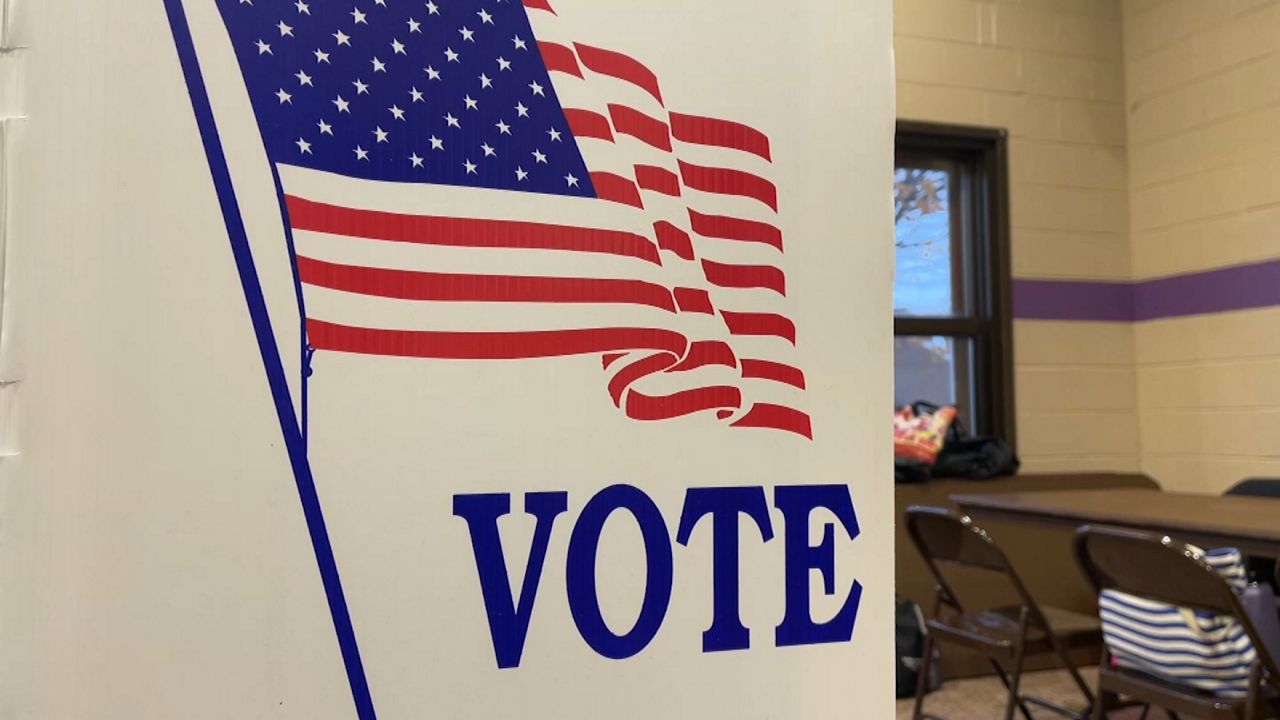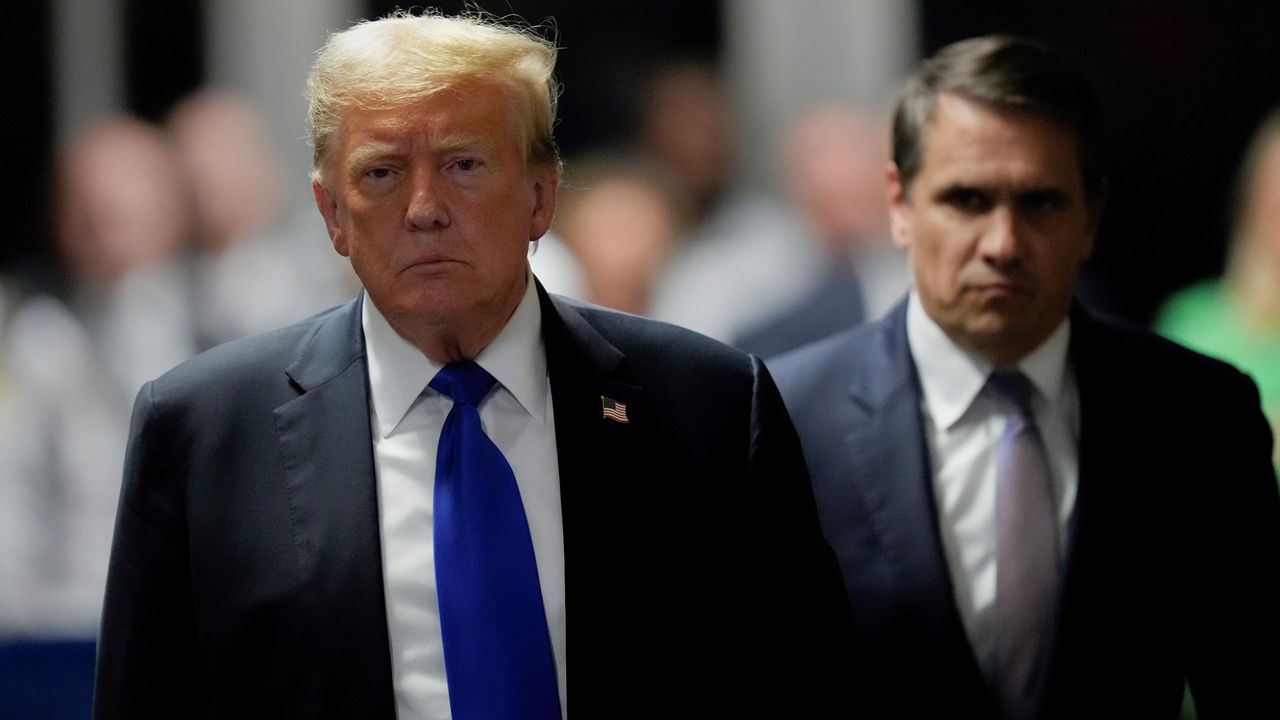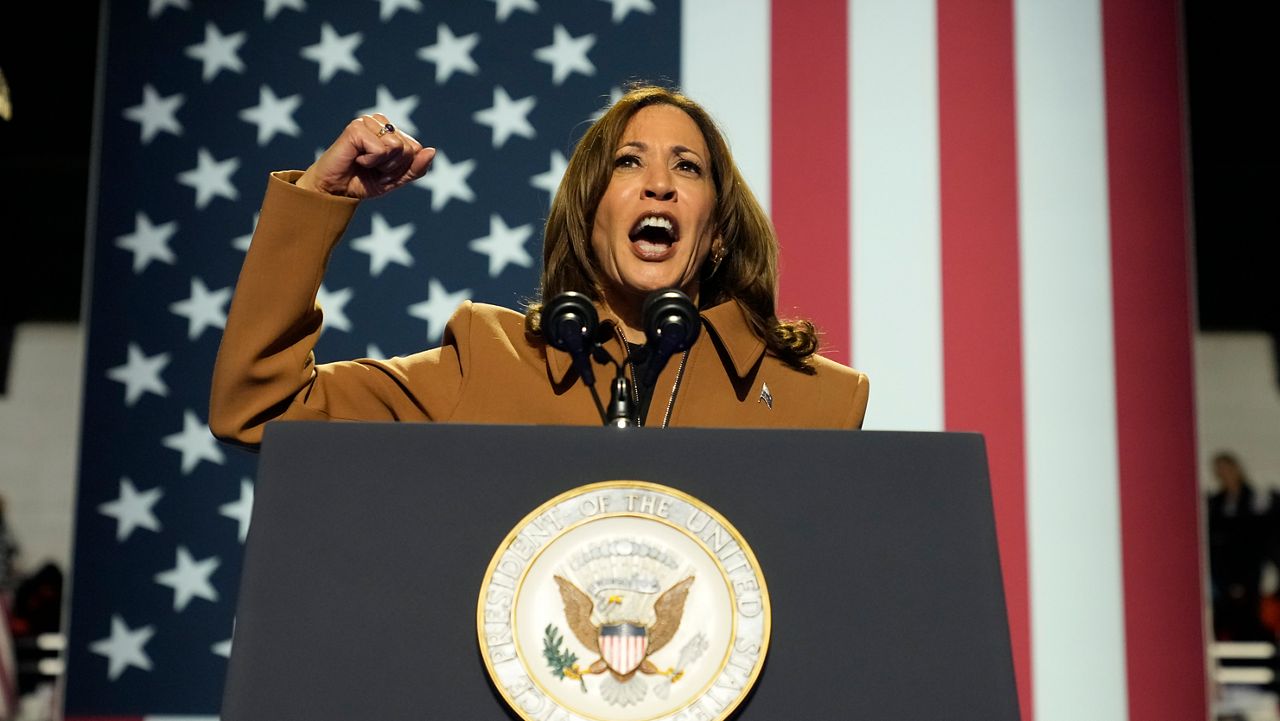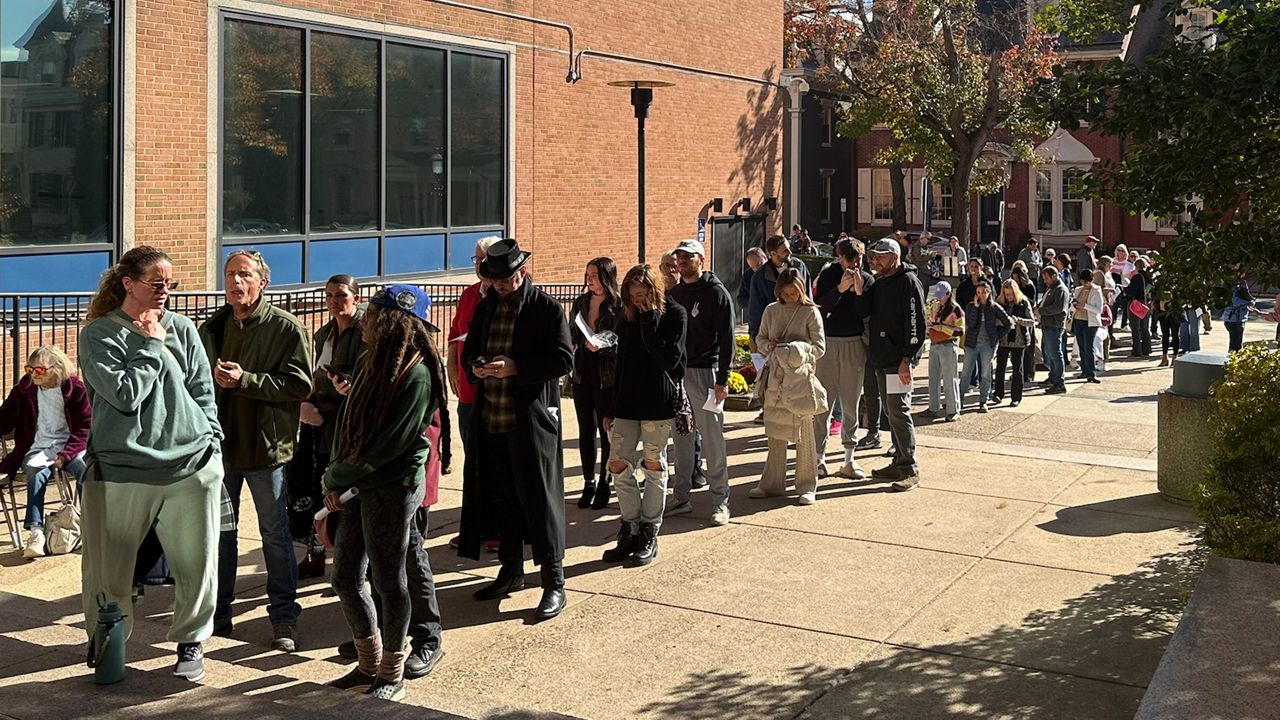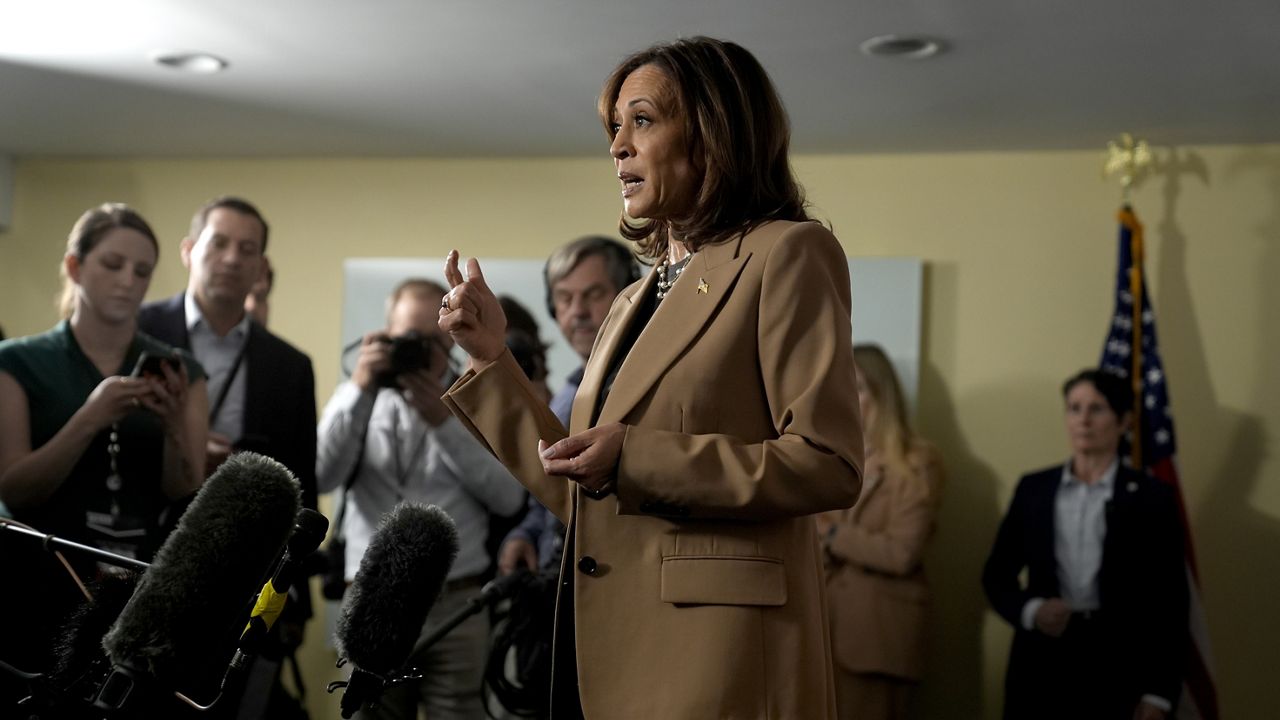When President Joe Biden won the battleground state of Arizona in 2020, it was the first time a Democratic presidential candidate won the state since President Bill Clinton won it on his way to reelection in 1996.
The Harris campaign is hoping it can keep that momentum of support growing in the final weeks of the election – while also combatting polling numbers that show the Vice President slipping in support among Latino men.
A New York Times/Siena College survey of likely Latino voters nationwide found that 56% back Harris – a significant majority, but slgihtly down from the 66% of Latino voters who backed Hillary Clinton over Donald Trump in 2016.
The erosion in support is more pronounced among Latino men. A USA Today/Suffolk University poll released this month found that 51% of Hispanic men 18-34 in Arizona plan to vote for Trump this year, while 39% plan to vote for Harris.
Raul Aguirre, the owner of REA Media Group in Tucson, Ariz., has been involved in politics since he was in college organizing for Cesar Chavez and the United Farm Workers. He said he doesn’t believe the polls are painting the full picture.
“People have said, ‘oh Latinos, Latino men, are flocking to Trump!’ I don't see that. I don't see it on the ground, I don't see it in the grassroots, I think it’s just a misnomer,” Aguirre told Spectrum News. “At least here in Arizona, 9 out of 10 Latinos that I speak to, Chicanos that I speak to, they're firmly with Kamala Harris and Tim Walz.”
Aguirre, who immigrated to the U.S. from Mexico, is proud of his Chicano heritage, and remembers being insulted “when former President Trump came down that escalator and started talking so vile about people of Mexican heritage,” and says this election is personal for him. He introduced Gov. Tim Walz at his rally last week in Tuscon and is campaigning for the Democratic ticket within his community.
“We've been here since the beginning of time through our own ancestral roots, indigenous roots, and when you target a group it is very embarrassing and very difficult,” said Aguirre. “Latinos are a very patriotic group. We've defended this country with our blood, sweat and tears since the beginning of the Republic.”
The father of seven daughters, he also worries about their reproductive freedom if Trump is elected again. “I want to make sure that they have command over their own bodies, and also that they're free to love whoever they want to love. So those things that Kamala Harris and Tim Walz are talking about struck a chord with me and with many of our people in different communities in the southwestern United States.”
While the Harris campaign may find Aguirre’s personal account reassuring, they aren’t taking Latino voters for granted in Arizona. Since Harris became the nominee, the campaign has launched an aggressive Spanish language outreach campaign, including phone banking six days a week, canvassing every weekend to reach communities that are made up primarily of Spanish speaking voters. Campaign staff say that in the last week, more than 17,500 calls were made to Spanish-speaking voters, and the campaign knocked on nearly 2,000 doors.
Across the state, the campaign says it has 19 coordinated offices with over 200 full-time staff on the ground knocking doors, making phone calls, and engaging their friends and neighbors to support Harris in every corner of the state – from Tempe to Sierra Vista, Nogales to North Phoenix.
The campaign has also made large ad buys for Spanish language ads, including a $3 million dollar radio ad buy for Hispanic Heritage Month in addition to multiple television ads. A campaign source say the television ads are being placed in coordination with high-viewership events that skew toward Latino voters, including El Gordo y La Flaca, Primer Impacto, Olympic Games, Major League Baseball games, game shows, high-ranked telenovelas, and La Liga de Fútbol and Leagues Cup matches.
One ad features Yasser Sanchez, an immigrant from Mexico who is now an immigration lawyer. Sanchez worked as a national advisor for Students for Romney in 2012, and on the late Sen. John McCain’s final senate campaign. But Sanchez said he never cast a ballot for Trump, and he’s using his voice to try and reach Latino voters and convince them to vote for Harris.
“[Voters] forget that Trump inherited a booming economy, and look at what he gave the Biden-Harris administration,” Sanchez pointed out. "They forget the direct persecution of immigrants, they forget how he made legal immigration nearly impossible when he was president."
It was just 8 years ago that Maricopa County Sheriff Joe Arpaio lost his bid for reelection, but Sanchez says for Latinos, it feels like yesterday. For years, Arpaio’s office was socially profiling Latinos in Arizona’s most populous county, leaving taxpayers to foot the bill for millions of dollars worth of legal settlements. Sanchez says when he talks to voters, he reminds them that Trump and Arpaio’s policies are not that far apart.
“When you link those two things together, that basically Joe Arpaio and Donald Trump are buddies, [that Trump] pardoned Arpaio, he comes to Arizona and he wants our vote – every time you bring that up to Latinos, and those of those that remember 10 years ago, they're like, ‘yeah, we can't have that nonsense come back.’”
“Donald Trump's policies – they are literally the policies of Arpaio and [former Arizona Gov. Jan] Brewer and SB 1070 with a red hat,” added Sanchez, referencing the controversial state immigration law which allowed law enforcement to arrest people without a warrant if they had "reasonable suspicion" they were in the country illegally.
Just one day earlier at Harris’ rally in Chandler, Ariz., Oscar Hernandez made a similar comparison. “We had someone named [Joe] Arpaio who was Trump before Trump, so we got a little bit of a taste of that, in that we here in Arizona were scrambling a lot…to see law enforcement being politicized against citizens…” Hernandez said, trailing off. “I guess what I’m trying to say is just that when I started to see that kind of narrative being pulled off by Trump and the Trump administration, it’s unfortunate to say that it was something that maybe we’re a little too used to here in Arizona.”
Hernandez, whose mother is a Mexican citizen, says he sees a brighter future under a potential Harris administration, and says he is encouraging friends and family to support her – including his fellow Latino men.
“When I think of Kamala Harris and when I think of my future, I think of how can I buy a house so I can support a family someday?” he questioned. “I think a lot of the time, men are just expecting things to come a little too easy these days. So let's just put in the work, the good times are coming and we just gotta toughen up right now. I know that Kamala Harris is giving a lot of options to people to think about the future, and that’s exactly what we need.”
Latino voters are expected to make up nearly a quarter of the electorate in Arizona this year. Stephen Nuño-Perez, a professor at Northern Arizona University, said Trump does have a slight advantage in terms of being a known commodity.
“Trump has been a pretty permanent feature of the political landscape for Latinos, so that familiarity is very helpful to Donald Trump. I think a lot of Latinos are just trying to learn about Harris, but I think a lot of young Latinos are tired of Donald Trump,” explained Nuño-Perez. But with Harris’ expansive war chest and energized base, he expects it to be a closely fought battle between the two candidates.
“The good thing about young people is that they have a lot of energy. So a lot of volunteers out there knocking on doors, getting people to come out to these events, and I think in terms of name recognition, I don't think she's gonna have a problem with that,” he said. “I think more so the problem would be getting Latinos to know what her policies are and what advantages they would have voting for someone like Harris over someone like Trump.”
With just three weeks to go, Sanchez says he is continuing his outreach about Harris’ policies through community events such as barbecues and door knocking leading up to Election Day. “We’ve got to end Trumpism, and we have to give our community a voice, a voice of reason, and let Latinos know that, you know, there's, there's the right team for us and then the wrong team for us,” he said.
He added that Arizona is still very much the state of the late Sen. John McCain.
“There's a lot of Republicans and Iidependents and even Democrats that really respect him for his efforts to work across party lines, and that's what we want in Arizona – we want people to work across party lines and get solutions done, like the bipartisan immigration bill that the Vice President, has said that she will pass once she becomes president,” said Sanchez. “Chaos is not leadership.”
Beyond Arizona, the Harris campaign has also launched “Hombres con Harris” in an attempt to reach Latino men in battleground states such as Nevada and Pennsylvania. Each event hosted by Hombres con Harris, according to the campaign, will feature members of the Congressional Hispanic Caucus, digital creators, and celebrities such as Aaron Dominguez, Guillermo Diaz, Nick Gonzales, and Al Madrigal, and more.
The events will be held at Latino-owned small businesses, sports bars, carnes asadas, union halls, and other community centered venues with the focus on “meeting Latino men where they are, in environments to discuss the issues that matter most to them and mobilize them to reach out to other Latino men, encouraging them to vote for Kamala Harris.”
The Trump campaign for its part says it is intensifying its English and Spanish media efforts, both paid and unpaid, targeting both battleground states and the national stage. A source within the campaign says it is collaborating with bilingual Hispanic influencers to amplify the campaign’s message across various media platforms on a voluntary basis.
Jamie Florez, the Trump campaign's Hispanic Communications Director, said that their "outreach is led by President Donald J. Trump and his track record delivering for Hispanic communities."






